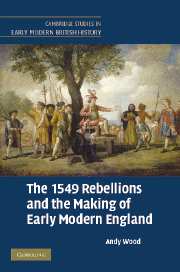Book contents
4 - Rebel political language
Published online by Cambridge University Press: 14 July 2009
Summary
Class does not coincide with the sign community … Thus different classes will use one and the same language. As a result, differently oriented accents intersect in every ideological sign. Sign becomes an arena of the class struggle … The very same thing that makes the ideological sign vital and mutable is also, however, that which makes it a refracting and distorting medium. The ruling class strives to impart a supraclass, eternal character to the ideological sign, to extinguish or drive inward the struggle between social value judgments which occurs in it, to make the sign uniaccentual.
(Voloshinov, Marxism and the philosophy of language, 23.)Questions of language are basically questions of power.
(Noam Chomsky, Language and responsibility (Hassocks, 1979), 191.)OF COMMONWEALTHS AND COMMOTIONERS
In September 1549, Sir Anthony Aucher wrote to William Cecil, warning him about the intentions of the rebels in Kent. Describing them as ‘these men called comon welthes’, he informed Cecil that the ‘comon welthes’ were declaring that ‘yf they have not reformacyon befor the Feast of Saynt Clement’ they intended to rise again. Aucher's letter is important for what it reveals of the gathering criticism of Somerset's policies. But it also highlights another important aspect of the 1549 rebellions: the way in which the rebellion entailed conflict over words and meaning. Perhaps the two words that were most freighted with significance in mid-sixteenth-century England were those mentioned by Aucher: ‘reformation’ and ‘commonwealth’.
- Type
- Chapter
- Information
- The 1549 Rebellions and the Making of Early Modern England , pp. 143 - 184Publisher: Cambridge University PressPrint publication year: 2007



